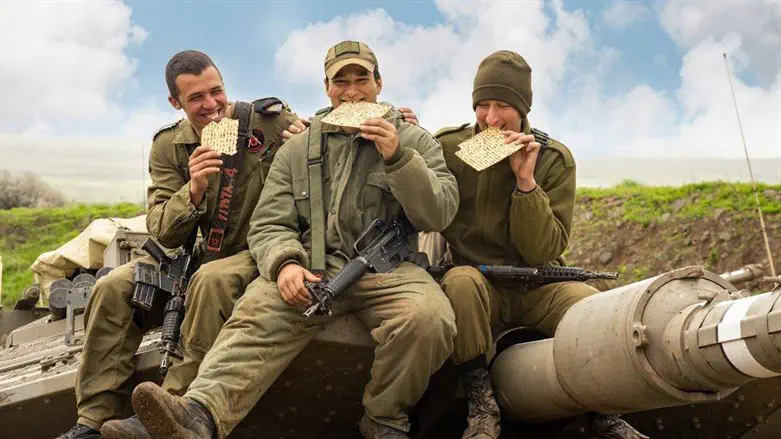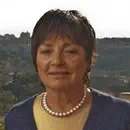
It was February 1982 and we answered an IDF call asking for volunteers to lead the Seder at IDF bases in March. We were duly contacted and told that an army vehicle would come for us early on the day of the Seder and bring us home sometime late the following night. Our offer to drive in our own car was firmly refused, so when that day dawned, we clambered into the green army vehicle that arrived at our address.
The driver drove on and on and on – and on – northward from our Jerusalem home, radio blasting, with our three excited youngsters enjoying every minute, especially the crackling messages that kept coming in on the radio, but with the two of us wondering how Israel suddenly seemed so endless.
Then we saw the sign that said "Do not pass this point, Lebanon", just as we passed it and went blithely on.
We arrived at the large, but temporary, army camp that was to be our Seder venue. Latrines (oy!), comfortable tents for sleeping and a few prefab buildings such as the dining hall and kitchen, packed dirt underfoot, cloudy skies. We were welcomed with smiles that expressed the soldiers' joy that there would be a real Seder, with real children and felt just wonderful.
I asked to see the Pesach food and seder symbols, and was shown into a small work kitchen, with a hose in lieu of a faucet and a gigantic sink to accommodate the enormous amounts of food washed there.
How heartwarming! The Israeli Rabbinate had sent all the Seder necessaries all the way up north: lots of matzot, wine, seder plates and fixings - and tons of lettuce. One look at the tens of heads of lettuce and I groaned inwardly. This was before the days of minimum-work Katif kosher lettuce and they all had to be checked, washed and scrubbed, leaf by leaf. I could hardly have it on my conscience that I knowingly allowed the 150 soldiers on the base to eat non-checked lettuce!
It was early afternoon, so I set myself up at the sink with a big cook's apron, but before I could begin, the base commander, who had greeted us on arrival, brought 4 sweet-faced young soldiers to help me.
And oh, what fun we had! They sang, they danced, we kidded around, they talked about their families and friends, asked about America. By the time we finished three hours later, I didn't care about my spongy hands (why would I think of bringing rubber gloves?), because I felt as if these charming boys in their creased and sodden green uniforms were now my adopted sons.
That's how it is with IDF soldiers, you know: When you are a student, they look as though they would make great boyfriends, then a few years later they remind you of your husband and his pals, another jump in time and they look like they could be your kids (and how could they trust them with these rifles, they're only children??? is what goes through your mind)– and one of them (or more) actually is your child. Sometimes it's the scatter-brained one who always forgot something everywhere, but is now a responsible soldier, carrying real bullets.
I couldn't help thinking about my childhood seders. How far away can you get from my Hassidic parents' New York home? There, we ate only round hand made shmura matza for the entire week of the holiday, had no dairy products because my father didn't trust any except for an awful cheese made by someone from his shtetel, did not eat "gebrokts" (matza that has been in contact with liquids, thereby eliminating knaidlach) – and somehow, my mother managed to make the most delicious foods. Our seders were a time of historic consciousness, my father in his kittel (white robe) chanting the ancient text and singing the tunes handed down through generations in his family, the table set with china and silver, the six of us children decked out in our new clothes, vying to tell commentaries we had prepared and standing dramatically to welcome Elijah,the Messiah's herald. All of us sang "Next year In Jerusalem" at the top of our lungs.
And here I was, in a makeshift dining hall at the edge of Lebanon, my husband chanting that very same text and explaining to 150 soldiers who were endangering their precious young lives for the Jewish people, how their nation was born and freed from slavery by the Almighty. How in every generation, foes arise to try to destroy us, but He saves us from their hand.
Yet I was sure I could hear my father's voice saying how proud he was to see us there – he, who had been a WWI soldier for Austro-Hungary, prisoner of war of the British, he who almost starved to death because he couldn't bear to taste non-kosher food. Every blessing he now made had special feeling in it, he would tell us, gratitude to Hashem for the food and also, for the ability to keep the laws of kashrut. He was a hareidi Zionist, wore a gartel (black cord worn as a belt during prayers by hassidim) and black hat, but whose eldest daughter, my late sister, married an IDF soldier wounded in 1948 and moved to Israel in 1950 with his blessing.
Look Papa, do you see? The Jewish army has a festive Pesach meal, a Seder plate, an afikomen! The entire army is kosher for Pesach!
Years later, our hesdernik [soldier who combines yeshiva study and army service] son would spend the seder in Gaza, barely managing to rush through the text and eat the mandatory foods before being called to action, but we didn't know that then – and I know Papa would have been even more proud of him.
Our IDF seder was lovely, our younger son said the Four Questions and was made to feel very special. The commander told us that he made a habit of going to lectures at Ohr Sameach Yeshiva and was starting to become interested in religious life, so he helped ensure that everyone could hear the explanations and joined in the rousing songs of Dayenu and Vehi Sheamda which they all knew . All the lettuce leaves were devoured, along with lots of matza and charoset.
But as we reached the songs at the end of the meal, an alert was sounded and the soldiers rushed out to waiting vehicles, all of them stopping to thank us and tell us how much they appreciated our coming north with the children. As the trucks and other vehicles left the camp, we stood outside to say goodby and they opened their windows and said "Chag Sameach", cheerfully waving at the children.
The First Lebanon War broke out two months later. And I couldn't remember their last names, the names of those four boys who splashed water all over the kitchen washing endless numbers of lettuce leaves with me. I don’t know if they got through the war unscathed, if they were wounded, if they returned home. I prayed for them.
And each year on Erev Pesach, I think of their laughter. On the Sabbath and IDF Remembrance Day, they are in my prayers for the welfare of IDF soldiers.
My grandsons, hesderniks, have since spent seders at far off army bases and sometimes on alert at Israel's borders. Everyone, observant or not, joined the seders. although I don't know who washed the lettuce..
Rochel Sylvetsky is Senior Consultant and op-ed and Judaism editor of Arutz Sheva's English site, and a member of the board at Orot Yisrael College and the Knesset Channel. A former Chairperson of Emunah Israel, she was CEO/Director of Kfar Hanoar Hadati Youth Village, member of the Emek Zevulun Regional Council and the Religious Education Council of Israel's Education Ministry as well as managing editor of Arutz Sheva (2008-2013). Her degrees, from are in Mathematics and Jewish Education. A version of this article was first posted in 2014.
